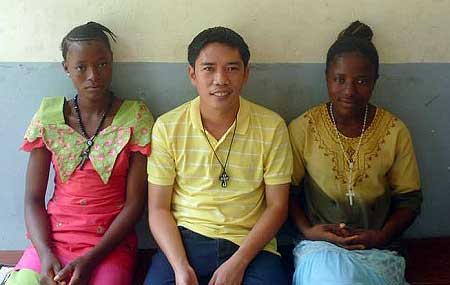
Fr. Anthony Patrick Santianez, flanked by two Sierra Leone faithfuls, decides to stay with his parishioners despite the threat of Ebola virus. CBCP NEWS
MANILA, Philippines—Another Filipino missionary has decided to stay in Sierra Leone despite the Ebola outbreak in West Africa although he admitted being scared and at one point considered coming home to the Philippines to avoid being infected with the deadly virus.
“Humanly speaking, I’m afraid of Ebola. Who wouldn’t be?” Fr. Anthony Patrick Santianez said in a post on the Web site of the Catholic Bishops’ Conference of the Philippines. “At first, I considered returning to the Philippines, but a touching petition by one of my parishioners changed my mind.”
“My parishioner told me: ‘Father, don’t leave us. Stay with us, because if you leave us we will get afraid more.’ This incident made me finally decide to stand by my people, my parishioners…. This is an opportunity to express solidarity with Sierra Leoneans,” he added as he urged Filipinos to pray for them and the people of Sierra Leone.
According to Santianez, who first came to Sierra Leone on June 24, 2008, his mother was also instrumental in making him want to remain there.
“Although my family knew from news reports what’s happening here, it surprised me when… my mother begged me to stay here. I knew outright it was God’s voice speaking through my mom,” the Xaverian missionary from Calbayog, Samar, said.
He added that he opted to stay “in order to share Christ with people who do not yet know Him.”
As assistant parish priest at the St. Guido Maria Conforti Church in Makine, Santianez administers the sacraments, teaches catechism, and makes home and community visitations in the Diocese of Makine.
“The people are kind to us. They don’t discriminate…. We have weekly catechesis. Aside from this, we visit them and talk to them. In our dealings with them, we get to know their culture better. I also use this opportunity to share with them the teachings of Jesus and His Church,” he said in the CBCP post.
Although a predominantly Muslim country, Santianez related that most Sierra Leoneans still adhere to folk beliefs and superstitions, which explain why authorities find it hard to contain the Ebola virus.
Citing the Ebola cases in his parish, the priest said Sierra Leoneans believe the shamans more than the medical professionals.
“My parishioners keep telling me that the five Ebola victims in our parish did not die of the virus, but of witchcraft, despite evidence to the contrary,” Santianez said.
According to him, Sierra Leoneans believe that people who succumb to witchcraft have to be washed following a certain ceremony before burial.
Santianez said the local health ministry strongly forbids this practice because it speeds up the transfer of the Ebola virus, but it continues.
At least four other Filipino missionaries are known to have opted to stay on in Sierra Leone and made their decision known ahead of Santianez.
The four, who belong to the Order of Augustinian Recollects, are Fathers Russell Lapidez, Roy Baluarte, Dennis Castillo and Brother Jonathan Jamero.
They are with two Spanish missionaries, according to an earlier post on the CBCP Web site.
“A few days ago, after conferring with each other, we, the Augustinian Recollect missionaries, have decided to remain steadfast to the mission entrusted to us. We are all afraid but we choose to be with our people to continue to give hope to them, especially during this time of difficulties,” Lapidez said.
The order began its missionary work in Sierra Leone in 1997, administering the Our Lady of Sierra Leone parish in Kamabai, Biriwa Chiefdom.
They were compelled to leave Sierra Leone due to the civil war but returned in 2004 after peace was restored in the country.
The Recollect missionaries in the Makeni Diocese are involved mainly in education and community organizing, fomenting a holistic development of faith experience, actively engaging the people and being part of the local community, according to the CBCP article.